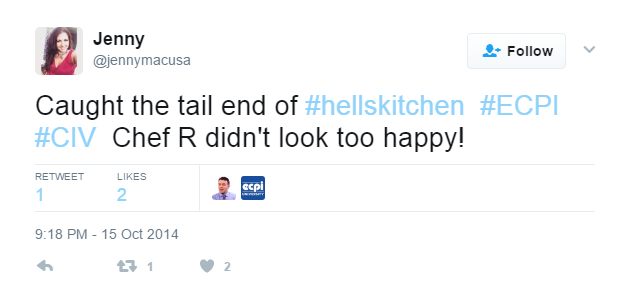
Communication Skills for Chefs: How Can You Communicate Effectively in the Kitchen?
Gordon Ramsay is an internationally renowned chef--but most people don't know if he can cook. Instead, they know him as the brash, sometimes verbally abusive chef on Hell's Kitchen and Kitchen Nightmares. He's frequently caught on camera berating and belittling kitchen staff and contestants who fail to properly prepare a piece of meet, get a plate to the pass in a timely manner, or make some other mistake.
If your only exposure to a restaurant kitchen comes from reality television, you might think that you're going to need to learn to sharpen your tongue as well as your cutting utensils.
But before you spend too much time practicing your screaming, take a look at what communication skills chefs actually need to succeed. Because in the real world, haranguing your colleagues won't get you as far as helping them. In the busy kitchen, being able to communicate with your colleagues is critically important. In fact, it's even listed as one of the top two job duties of a chef by the U.S. Bureau of Labor Statistics.
Actually, it's a proven fact that many of the most well-respected chefs in the world never have to intimidate, bully or even yell in order to communicate and cook great food.
Here's a look at the communication skills all great chefs share, whether they are celebrities or not:
Compassion: Everyone Makes Mistakes, Be Understanding
Mistakes happen--especially in the kitchen.
The chefs who understand and accept this fact are better prepared to figure out what went wrong and put a plan in place to fix it.
If you fly off the handle and start yelling every time a mistake is made, you're likely to lose the support of your kitchen staff and colleagues. They might become embarrassed, flustered, or insecure--all of which tend to lead to more mistakes. Gordon only gets away with it because he's famous.
On the other hand, if you are compassionate and show that you understand that mistakes happen, you and your colleagues can find a constructive way to fix the problem.
Respect: These are your Colleagues, Treat them Like It
In the heat of the moment, when the smoke is billowing through the kitchen and the orders are coming in hot, it can be easy to lose your cool.
But it's no excuse for being disrespectful.
You may be the executive chef, head chef, or sous chef, but at the end of the shift (and at the beginning and in the middle) everyone in the kitchen is on the same team and working towards the same goals.
Respecting this shared dedication is important, because the kitchen can't succeed unless everyone feels respected. So before you lose your cool, take a few deep breaths and extra seconds to think about what you need to say, and then say it with respect.
Brevity: Time is Precious in the Kitchen, Don’t Waste it
The ability to communicate clearly and concisely is a skill shared by all great chefs. Even Gordon Ramsay doesn't bother wasting a lot of words when he's yelling at someone in the kitchen.
Belaboring mistakes or going into long-winded dissertation about what you’re working on doesn't work in the kitchen. Learning to quickly get your point across ensures that you and your colleagues can keep plates rolling out to the waitstaff without missing a beat.
Listening: Working With your Colleagues Means Listening To Them
Everyone in a kitchen has a role to play, and everyone's role typically dependent on someone else. That's why it's so important to be able to listen to what your colleagues are saying--especially if you are the boss.
Line cooks at each individual station know exactly what the ingredients look like. The waitstaff has valuable insight into how customers are feeling about the food. The caller can help keep food moving and identify possible shortages.
But you will only know this and be able to respond correctly, if you listen.
Consistency: Be the Dependable Communicator your Team can Count On
Every great team shares information, ideas, and concerns--and they do it on a regular basis.
Consistent communication--whether through weekly meetings, text messages, or a staff noticeboard--keeps everyone on the same page. It reduces surprises. And most importantly, it provides an opportunity for you to address concerns, recognize excellence and set clear expectations.
Things can change quickly in a kitchen, so committing to consistent communication that includes all of your teammates in the cycle is critically important to ensuring that everyone is working towards achieving the same goals.
Complete Your Culinary Skills with Communication
Gordon Ramsay has made a nice life for himself in large part by shouting at people. That typically won't work for most people. Most people need a combination of exceptional culinary skills that are complemented by exceptional communications skills.
If you’re interested in earning your Associate of Applied Science in Culinary Arts and fulfilling your dream of working in a professional kitchen, consider ECPI University’s Culinary Institute of Virginia. With an accelerated schedule and year-round classes, you could graduate sooner. For more information, contact a friendly admissions advisor today.
Remember, communication is key to having a successful career as a chef.
It could be the Best Decision You Ever Make!
DISCLAIMER – ECPI University makes no claim, warranty, or guarantee as to actual employability or earning potential to current, past or future students or graduates of any educational program we offer. The ECPI University website is published for informational purposes only. Every effort is made to ensure the accuracy of information contained on the ECPI.edu domain; however, no warranty of accuracy is made. No contractual rights, either expressed or implied, are created by its content.
For more information about ECPI University or any of our programs click here: http://www.ecpi.edu/ or http://ow.ly/Ca1ya.




